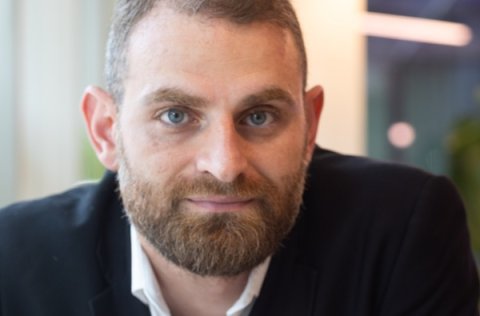CNME Editor Mark Forker sat down with Rami Abu Arja, Senior Innovation Marketing Manager at Yasmina, Yango Group, to learn more about how their human-like bilingual AI-powered assistant is reshaping the smart home space, and why consumers now crave hyper-personalised experiences.

The ‘smart home’ space is a burgeoning industry vertical that has grown exponentially over the last few years.
Unsurprisingly, the UAE, which is regarded globally as one of the most vibrant hubs for technology, innovation, creativity, bold design and entrepreneurship, has seen rapid growth in its own domestic smart home marketplace.
The UAE leads the rest of the GCC region when it comes to smart home adoption, due to a combination of factors, namely high disposable incomes, forward-thinking smart city policies, and strong urbanisation.
A product that has emerged as a market leader in the smart home space is the AI-powered smart speaker Yasmina from Yango Group.
Yasmina is a bilingual AI assistant powered by a YangoAI LLM, an advanced model developed for natural, conversational speech, complete with jokes and cultural awareness.
Rami Abu Arja is the Senior Innovation Marketing Manager at Yasmina, Yango Group.
He has been the driving force behind Yasmina’s dominance in the smart home sector across the UAE, and is known for his ability to bring innovative and disruptive products to the market.
In a candid interview with CNME, he spoke all things AI, and he began the conversation by outlining what he thinks is going to be the next ‘big leap’ in terms of integrating AI.
“The AI marketplace is developing at an extremely fast pace — it is always evolving and moving in new directions. There’s a lot of discussion around Agentic AI, and significant investment is directed towards that. As for the smart home and AI-assistant sectors, I think the next big trend will be centred on personalisation. Consumer psychology has changed — we used to be comfortable using different apps for different tasks, but that’s no longer the case. Today’s users want a single device that can communicate with all their applications, assist with multiple tasks, and ultimately deliver hyper-personalised experiences,” said Abu Arja.
Abu Arja pointed to a study from Deloitte that reinforced his views on the fact that customers want a unilateral interface for interacting with all their applications on a daily basis.
“Deloitte conducted a comprehensive report on this topic, revealing that 34% of respondents want a more user-friendly experience across their entire app ecosystem. They want one ecosystem that delivers everything for them, they want to move away from the current fragmented approach, where you jump from app to app. 57% of those surveyed also want an AI system that can manage all aspects of their smart home. So it’s clear that everyone is leaning toward AI assistants that can help them with everything and deliver the personalisation they want. This is where Yasmina comes into play with its ability to connect a wide range of smart home devices, delivering the personalised experiences consumers are demanding,” said Abu Arja.
One of the key components in the success of Yasmina is its cultural relevance.
That has struck a chord with the marketplace across the UAE, and, as Abu Arja points out, Yasmina’s ability to understand different dialects, again enables it to deliver that personalisation.
“We believe that an AI assistant has to fit naturally into everyday life, and the way you interact with it should feel as effortless as speaking with family or friends. We know that the two main languages are English and Arabic here in the UAE. However, for a truly localised AI assistant, understanding standard Arabic isn’t enough — that’s why we designed Yasmina to understand and respond to multiple regional dialects. That is a key USP for us. At the end of the day, I believe consumers want something simple and easy–to–use, and Yasmina delivers just that. Simplicity drives satisfaction, and as a company, we are always looking to improve our services to simplify modern everyday life — whether by integrating with more smartphone platforms or connecting with a wider range of smart home devices, from washing machines to air conditioners and TVs. Our goal is to help create a unified smart home ecosystem that streamlines everyday life,” said Arja.
One of the very interesting aspects of the current AI movement is the fact that it is the first industrial revolution in history that will potentially lead to mass casualties for ‘white collar’ workers.
In the past, it was blue-collar workers who felt the pinch of technological progress, but with Agentic AI and Gen AI, developers and engineers on six-figure salaries are being let go.
Abu Arja is someone at the coalface of AI innovation on a daily basis, and he is hyperaware of the dystopian view held by many when it comes to AI, and the age-old human versus robots debate.
When asked how he tries to temper the flames of negativity around AI, he prefers to focus on the fact that AI is an enabler.
“It certainly is a hot topic — and with good reason. AI’s transformative potential and massive scale make it difficult to grasp all at once. As for me, I see AI as an enabler. It has fundamentally been developed so we can do more. It also allows us to have more time for ourselves. Much of the fear and hysteria around AI comes down to a lack of understanding.. We need to not only learn more about AI, but to embed it into our culture and daily lives. The UAE has taken the lead in this regard; it was the first country in the world to appoint a dedicated Minister of AI, and now it has recently announced that AI will be taught in all schools. Research from MIT involving children aged 7 to 12 using AI tools showed improvements in reasoning and creativity, which shows that AI can also be a powerful educational tool for children. It goes without saying that AI needs to be used ethically and responsibly, but we need to embrace AI because it’s not going away, and we need to understand and see it for what it is — a tool that enables us to do more,” said Abu Arja.
Abu Arja also added that AI is actually helping to create and establish a much better work-life balance.
“There are some tasks that are mundane and would take hours out of your day, for example, administrative work. However, now, due to the power of technologies like Agentic AI, you can complete those tasks in minutes, and that frees up a lot of time for you to spend with family and friends,” said Abu Arja.
The final part of our conversation pivoted towards the topic of ‘accessibility’ when it comes to AI, and the role played by private sector companies like Yasmina in creating an ecosystem in which everyone in society can benefit from AI.
“Making AI accessible to all is incredibly important, and once again, the UAE is leading the way in this by making ChatGPT free for everyone. It’s yet another example of the forward-thinking leadership of this country. We want to have more interaction with communities because at the moment, global technology doesn’t really serve local communities, and there is a gap there. We reached out to Rashid Center for People of Determination, which works with children aged 5 all the way up to adults in their 30s, and offered them Yasmina. Yasmina is now in their classrooms, and it is helping students learn in new and meaningful ways, with the technology integrated in their learning environment. Rashid Center for People of Determination has also created a sort of smart centre, where they have deployed multiple sensory-friendly technologies designed to enhance linguistic and cognitive development. From a linguistic perspective, that’s where Yasmina was a great fit, because of her ability to understand multiple dialects and speech patterns. In short, AI is a powerful tool, but it needs to be accessible, and at Yango Group, through Yasmina, we are committed to ensuring every part of society can benefit from AI,” said Abu Arja.





